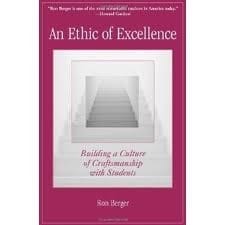Reading Ron Berger’s ‘An Ethic of Excellence’ should not be undertaken in the hubbub of morning buses or busy trains, nor it the middle of a lively office – it should be enjoyed in the privacy of a quiet room at home – preferably in a New England home, designed by Ron himself, with a roaring log-fire burning…well, we can all dream!
Seriously, his book is rather an extended essay reflecting upon his patent wealth of experience, his humanity and his clear generosity of spirit as an educationalist. He is quite obviously both an outstanding teacher and a master craftsman – a character Robert Frost would have written a great poem about! Indeed, there is something poetic and heart warming about his many anecdotes that he shares. His book does not simply offer comfort to an assailed group of teachers however; he also offers practical tool kits for creating building ‘an ethic of excellence’ within schools.
The ‘Ethic of Excellence‘ is a great book for teachers, and most definitely leaders, at all levels, who are passionately interested in their craft. Clearly, the best way for you to get a taste of the book is to read it, so I have selected some choice quotations from the book to think about and hopefully encourage you to read this great book.
Firstly, this quotation, from the introduction, is a timely reminder for Gove and his ilk about the great work that already exists in our schools:
“I’m concerned when I pick up a newspaper these days and so often find an article about the “crisis” in education and how a new quick fix will remedy things. More tests, teacher-proof curriculum, merit pay, state standards.
It reminds me of the advertisements for diet products. Fast Weight Loss! Dramatic weight loss! No Work! Lots of money is spent on diet products and a lot is spent on new educational tests. But it seems that almost everyone who loses weight quickly with the aid of a quick fix product ends up gaining it all back. Weighing yourself constantly doesn’t make you lighter and testing children constantly doesn’t make them smarter. The only way to really lose weight and keep it off, it seems, is to establish a new ethic – exercise more and eat more sensibly. It’s not a quick fix. It’s a long-term commitment. It’s a way of life.
I have had a hard time thinking about a quick fix in education because I don’t think education is broken. Some schools are very good; some are not. Those that are good have an ethic, a culture, which supports and compels students to try and to succeed. Those schools that are not need a lot more than new tests and new mandates. They need to build a new culture and a new ethic. I don’t believe there’s a shortcut to building a new culture. It’s a long-term commitment. It’s a way of life.” (P4, ‘An Ethic of Excellence’)
This extract reflects brilliantly upon the transformative power of an individual piece of learning:
“I believe that work of excellence is transformational. Once a student sees that he or she is capable of excellence, that student is never quite the same. There is a new self-image, a new notion of possibility. There is an appetite for excellence. After students have had a taste of excellence, they’re never quite satisfied with less; they’re always hungry. When the teachers at the Austine School for the Deaf pointed out to Sonia that many students wouldn’t obsess over their work as she does, her reply was quick: This school has ruined me for life, she said. I’m never satisfied with anything until it’s almost perfect. I have to be proud of it.” (p8, ‘An Ethic of Excellence’)
This extract reflects upon the power of ‘Critique’ in shaping good practice and it provides simple but effective guidelines for peer assessment:
“We try to begin with the author/designer of the work explaining her ideas and gaols, and explaining what particular aspects of the work he or she is seeking help with.
We critique the work and not the person.
We try to begin our critique comments with something positive about the work, and then move on to constructive criticism.
We try to use I statements when possible: ‘I’m curious why you chose to begin with this…?’ Or ‘Have you considered including…?'” (P94, ‘An Ethic of Excellence’)
This concept of the ‘assessment inside the student’ really struck me:
“Most discussions of assessment start in the wrong place. The most important assessment that goes on in a school isn’t done to students but goes on inside students. Every student walks around with a picture of what is acceptable, what is good enough. Each time he works on something he looks at it and assesses it. Is this good enough? Do I feel comfortable handing this in? Does it meet my standards? Changing assessment at this level should be the most important assessment goal of every school. How do we get inside students’ heads and turn up the knob that regulates quality and effort.” (P103, ‘An Ethic of Excellence’)
Finally, what I find most powerful about this short little book is the tremendous warmth towards his students, and young people more widely, that emanates from his words. There is no dispassionate irony, his style is graceful but wholly focused on improving education for students for the sake of students. Mr Gove could well do with having this is his in-tray. Creating systems of school competition and running schools for profit are exposed as brittle and fraudulent in contrast to the values of cooperation and excellence at the heart of Berger’s brilliant book.
Try it, buy it – trust me, you won’t regret it: http://www.amazon.co.uk/An-Ethic-Excellence-Building-Craftsmanship/dp/0325005966






Comments